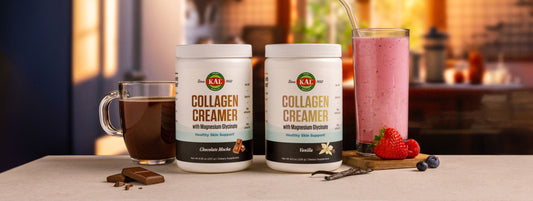Ever notice how tired most adults say they are?
Life is exhausting, and our energy levels have a direct impact on our ability to embrace every moment. But before you resort to caffeine and other quick fixes, consider supporting optimal energy at the cellular level.
How Does Caffeine Give You Energy?
Caffeine is found in coffee, tea, soda, and energy drinks. They are very popular because they increase energy in the short term. However, long-term, chronically consuming these drinks may not be good for you and may even do the opposite—make you more tired.
Caffeine is considered a central nervous system stimulant that, in the short term, gives you more energy and helps support brain function including memory and attention.1 However, overconsumption of caffeine can cause insomnia, anxiousness, jitters, fast heart rate, upset stomach, headache, and feelings of unhappiness. In addition, when sugar is added to coffee or other caffeinated drinks, it can lead to a “crash” that some people feel only a few hours after consumption.
To achieve sustained energy levels without the crash, consider reaching for vitamin B-12 instead of a sugary latte.
How Does Vitamin B-12 Give You Energy?
Vitamin B-12 is a water-soluble vitamin that needs to be constantly replenished via food or dietary supplements. Vitamin B-12 is not a stimulant. While it doesn’t directly spike energy levels, it supports energy on a cellular level while also supporting healthy red blood cell production, energy metabolism, and nerve function.2 For this reason, one of the hallmark signs of not getting enough B-12 is fatigue.3
B-12 can be found in animal foods such as meat, poultry, fish, eggs, and dairy with little naturally occurring B-12 in plant foods unless they are fortified.2 However, B-12 absorption from food slows down as one ages.4 Vegetarians and the elderly may have difficulty getting enough B-12 through diet alone.5
Fortunately, B-12 is available as a dietary supplement to help fill in potential nutrient gaps.
B-12 Supplement for Energy
Because absorption can be an issue with vitamin B-12, look for a liposomal supplement. Liposomes create tiny spherical structures that surround the nutrient molecules. This protective lipid bilayer helps the nutrient, such as vitamin B-12, travel intact into the small intestine, which leads to gentle digestion and optimal absorption.
KAL Liposomal B-12 is a powerful supplement using the latest technology to help support cellular energy while supporting healthy red blood cell production and nerve function. If you’re feeling fatigued, consider kicking off your day with a B-12 supplement.
References
- Fiani B, Zhu L, Musch BL, et al. The neurophysiology of caffeine as a central nervous system stimulant and the resultant effects on cognitive function. Cureus. 2021;13(5). https://www.cureus.com/articles/60112-the-neurophysiology-of-caffeine-as-a-central-nervous-system-stimulant-and-the-resultant-effects-on-cognitive-function#!/
- National Institutes of Health Office of Dietary Supplements. Vitamin B-12 fact sheet for health professionals. 2024;Mar 26. https://ods.od.nih.gov/factsheets/VitaminB-12-HealthProfessional/
- Ankar A, Kumar Al. Vitamin B-12 deficiency. StatPearls. 2022;Oct 22. https://www.ncbi.nlm.nih.gov/books/NBK441923/?report=reader#_NBK441923_pubdet_
- National Academy of Sciences. Dietary reference intakes for thiamin, riboflavin, niacin, vitamin B6, folate, Vitamin B-12, pantothenic acid, biotin, and choline. National Academies Press (US). 1998;9. https://www.ncbi.nlm.nih.gov/books/NBK114302/?report=reader#_NBK114302_pubdet_
- O’Leary F, Samman S. Vitamin B-12 in health and disease. Nutrients. 2010;2(3):299-316. https://www.ncbi.nlm.nih.gov/pmc/articles/PMC3257642/




